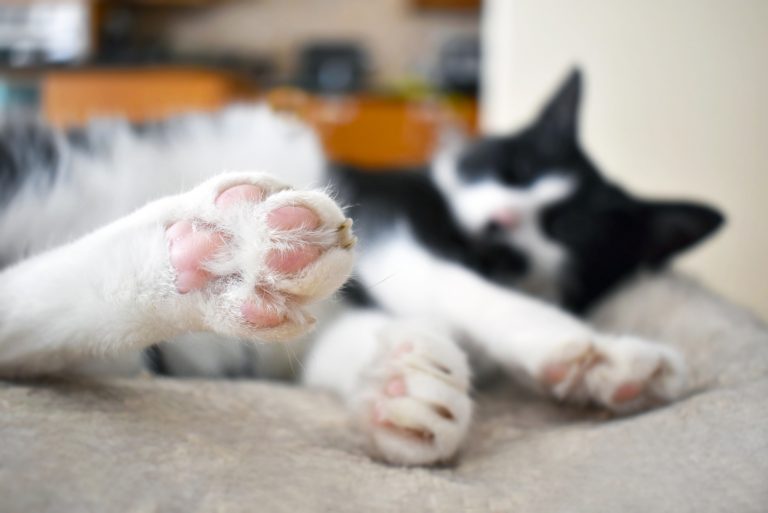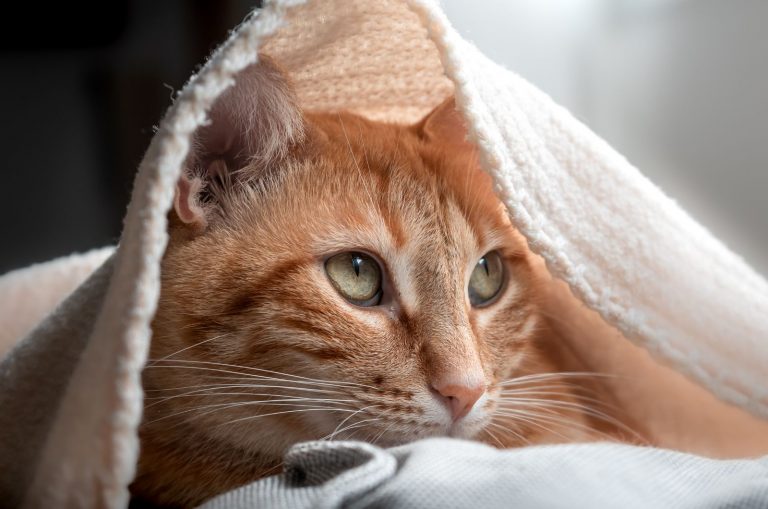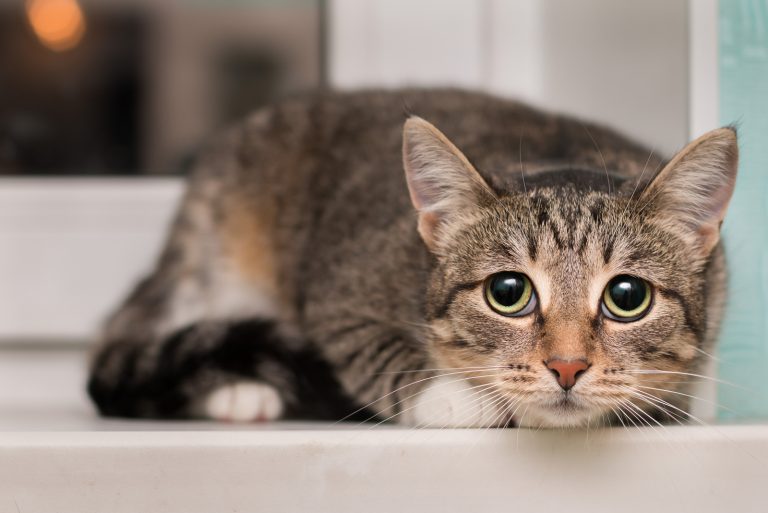Why Does My Cat Scratch The Wall? 10 Reasons And Tips To Fix It
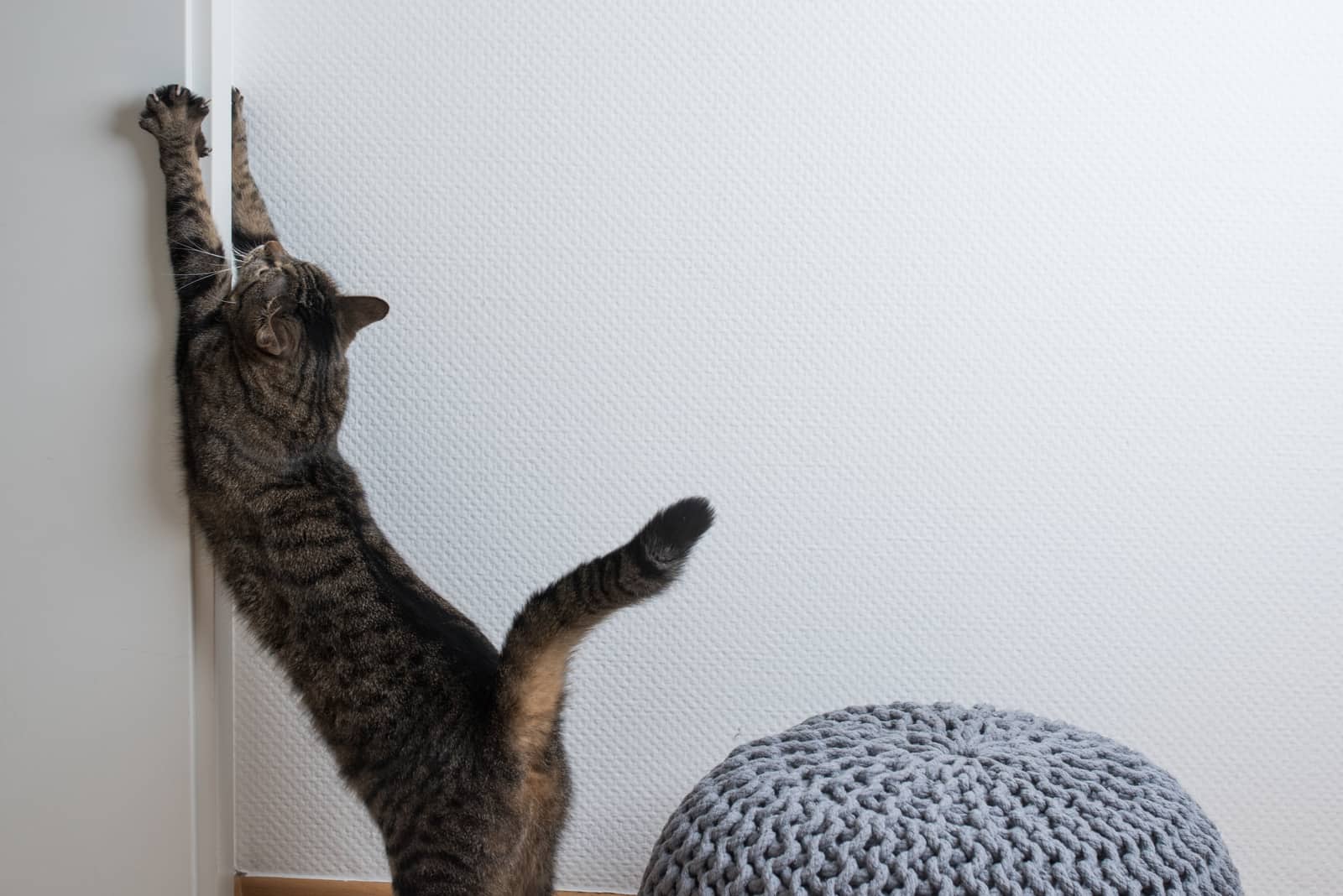
You’ve just come home from work, and your living room wall looks like it has been visited by Freddy Kruger? We know how you feel.
It can sometimes seem that our cats do things just to annoy us. The worst thing about this is, their shenanigans can often cost us a lot of money!
The truth is, cats scratching walls or furniture is just a normal part of the life of a cat owner.
Cats have many reasons why they might scratch the walls, ranging from simple maintenance to extreme displeasure.
So, if the question “Why does my cat scratch the wall?” is bothering you, continue reading to find out 10 possible reasons why it may be happening, and 6 tips on how to resolve it.
10 Reasons Why Does My Cat Scratch The Wall
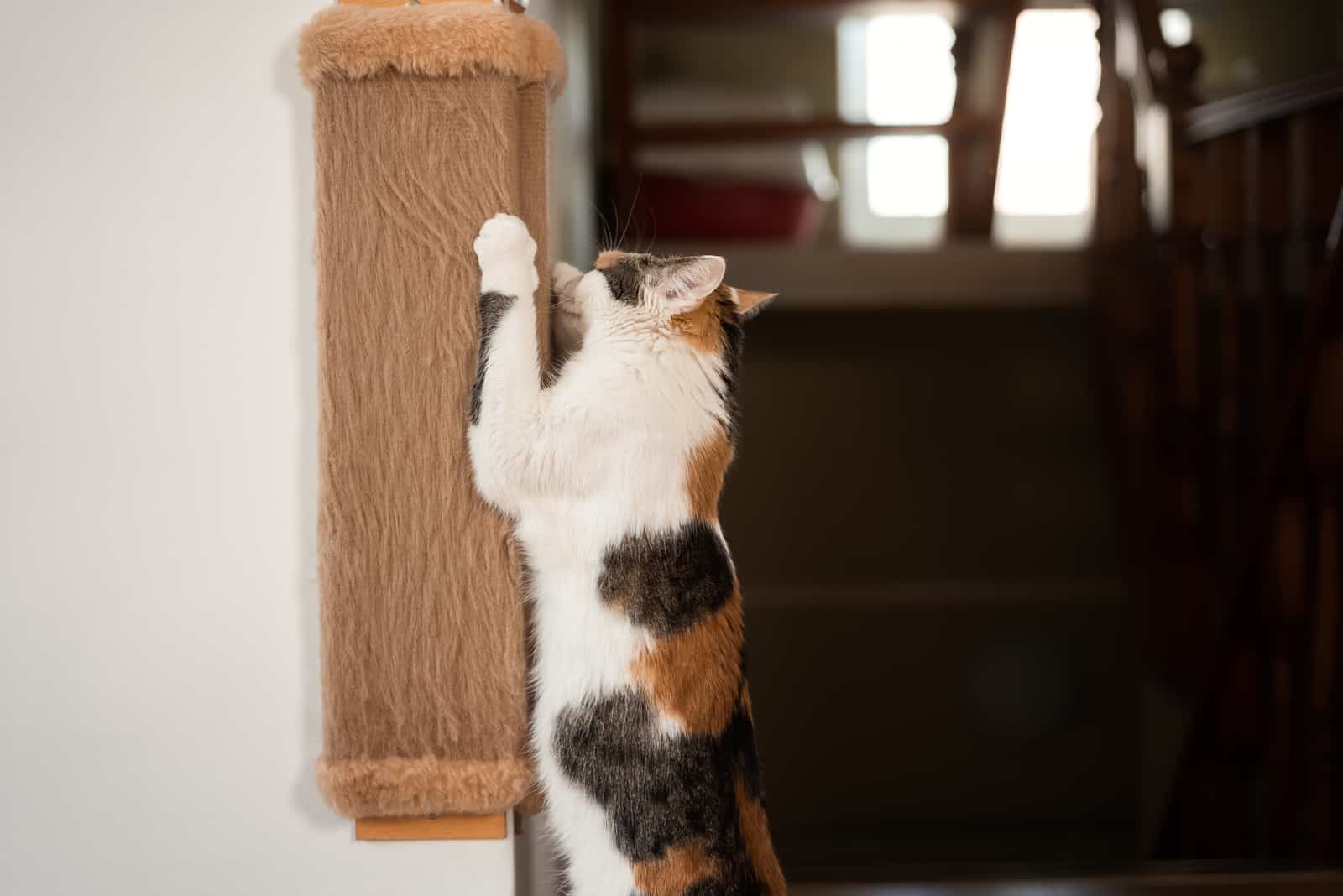
There really are a plethora of reasons why cats engage in scratching behavior, or what you might call “inappropriate scratching”.
Cat’s claws are a big part of their identity. They are crucial for climbing performance, athletic displays, hunting, and defensive actions.
As you’ll learn, cat’s claws can often be used to show displeasure or other emotions. More often than not will cats use their claws as a form of communication, especially with their owner.
It makes sense to try to learn about scratching behavior as much as we can. This will help you understand your cat better, and it will help you to prevent destructive scratching.
The following are the 10 most common answers to “Why does my cat scratch the wall?”.
1. Nail Trimming /Claw Maintenance
Along with a rather menacing bite, a cat’s claws are the most important part of its weaponry. Cats also rely on their claws for many of their acrobatic movements, like climbing.
If you’re asking yourself “Why do cats scratch walls?” this may be your answer.
Cats usually scratch to get rid of a built-up protective sheath, which is essentially a husk of dead material which dulls the blade of a claw.
This scratching behavior is perfectly normal, and most of the time it is necessary for your cat to feel good and well-protected.
Larger, wilder cats also have scratching habits that keep their arsenal sharp, and your purry kitty is no different.
When it comes to scratching the wall, this is more of an indoor cat behavior. When an indoor cat’s nails need trimming, the wall seems like the best scratching surface offered.
This should be easily fixed by letting your cat go outside more, or installing a scratching surface that you’re not afraid of ruining.
2. Marking Territory
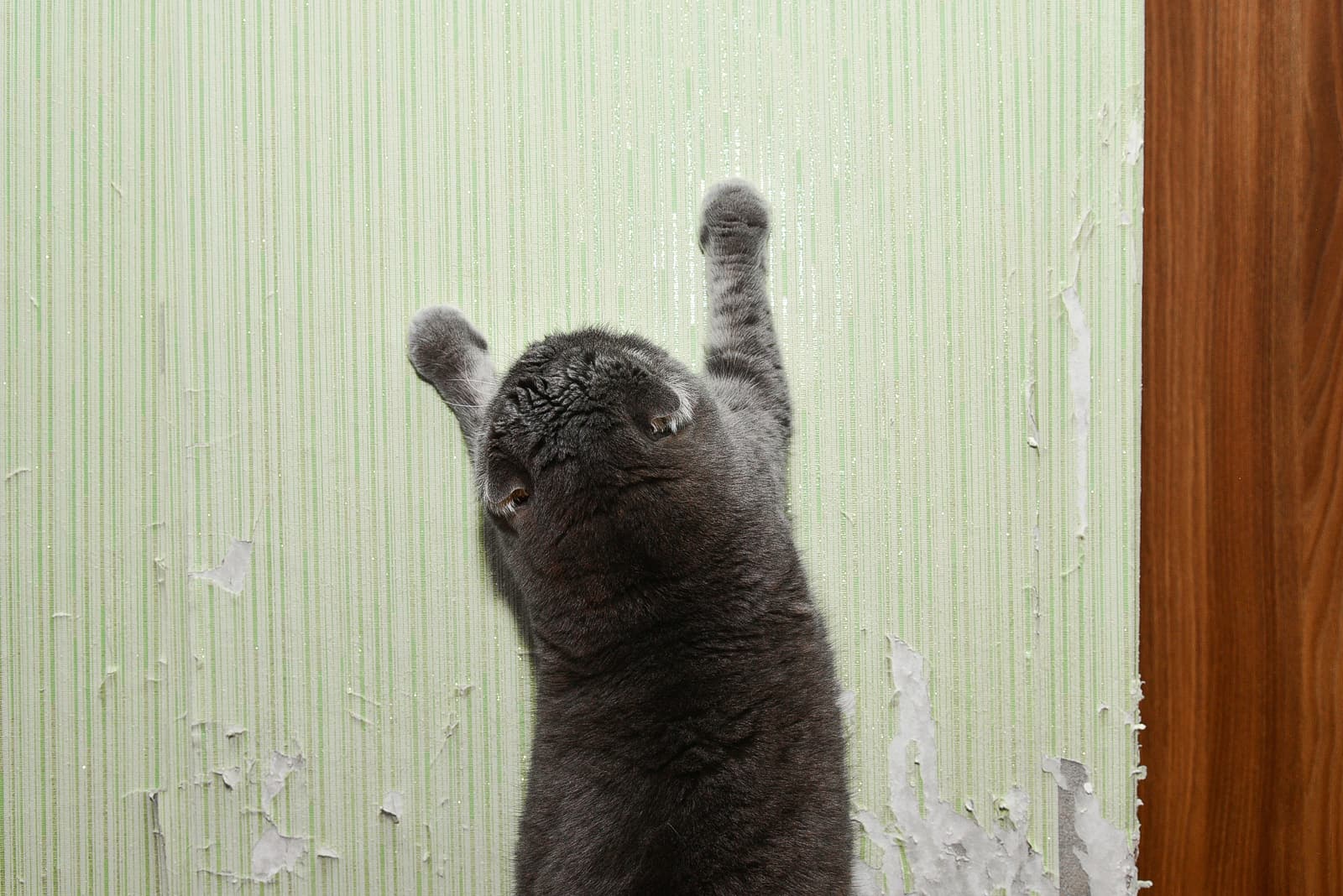
Felines are known to be a very territorial family of animals. Researchers have discovered that a single tomcat can claim a territory of around 1000 acres.
There are probably dozens around, and your cat senses them.
This could potentially be the reason why your cat decided the wall was a good place to scratch. Cat’s paws contain scent glands, which release pheromones when they scratch.
Your cat could be scratching the wall to mark that territory, in case an intruder happens to try to usurp their claim.
Cats sense the pheromones of other cats, which means that the scratching will inform other cats whose patch of land this is.
It is also good to know that territory marking doesn’t occur regularly. If a previously marked territory holds their scent, they won’t touch it. They will only repeat the scratching if they are trying to fix their claws or their previous scent mark has been replaced by another cat or cleaned away.
However, if you’re moving into a new home, or you’re getting new furniture, you should expect a few scratches to appear.
3. Stress
Although they sometimes seem cold blooded and unbothered, cats can often be stressed for various reasons.
Experienced pet owners know how important it is to keep a cat’s environment stress free, because it can often result in destructive scratching and littering.
Since scratching is an instinctive and habitual action, scratching behavior can offer your cat comfort and consolation that everything is alright.
Changing home, new pets, new scents, loud noises, and separation can all negatively affect a cat’s mental health.
In most cases, a cat needs a habitual environment. This means the same inhabitants in the same home, coming and going regularly at the same time.
Only very rarely will cats tolerate diversions from the schedule.
So, if you stayed late at work and you’re asking yourself “Why is my cat scratching the wall”, the answer might be because she missed you!
4. Inter-Cat Conflicts
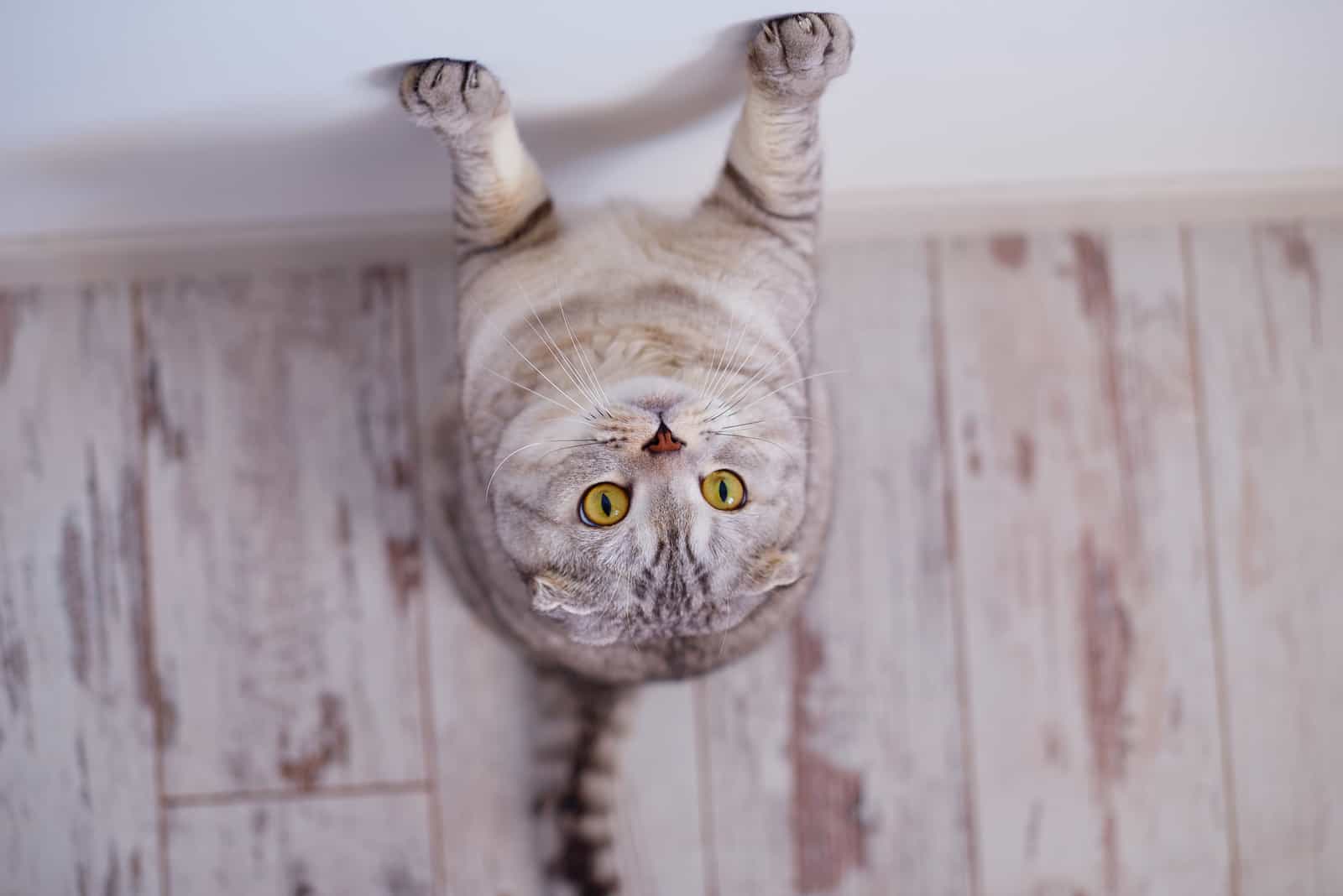
Conflict is a very integral part of a cat’s nature. Be it a small domesticated cat, or a wild, huge tiger, cats will always feel a sense of unease when around other cats.
Cat’s scratching on the wall can indicate that your cat is engaging in conflict with other cats, even if you don’t notice it.
We’ve already covered the size of the patch that one cat wants to control. Imagine having two cats living in the same house, and they’re both trying to one-up each other.
If one of your cats decides to scratch a certain wall, be sure that the rest of them will have a go at it as well.
Even though they’ve allowed another pet to stay on their patch, they still won’t allow their pheromones to contaminate their chosen area.
This type of scratching is a bit different from territorial scratching, because it is motivated by distress, while territorial scratching is just a protocol in cat behavior.
We suggest separating your cats and giving them all distinct scratching posts.
5. Happiness Or Boredom
One of the answers to “Why do cats scratch walls” may be “because they’re happy”.
If your cat is feeling happy and comfortable in your home, it may want to play around, which can often lead to scratching.
However, some cats may be engaging in scratching behavior because of boredom. This might happen if you’ve spoiled your cat in the past.
You may have bought your cat a lot of playthings in the hope that they would divert its attention. This doesn’t mean that your cat can’t still get bored!
Cats quickly get tired of their toys. This could mean that your cat is scratching out of boredom. We recommend spending more time with your pet, or getting it a companion.
6. Cat Scratching Walls After Pooping
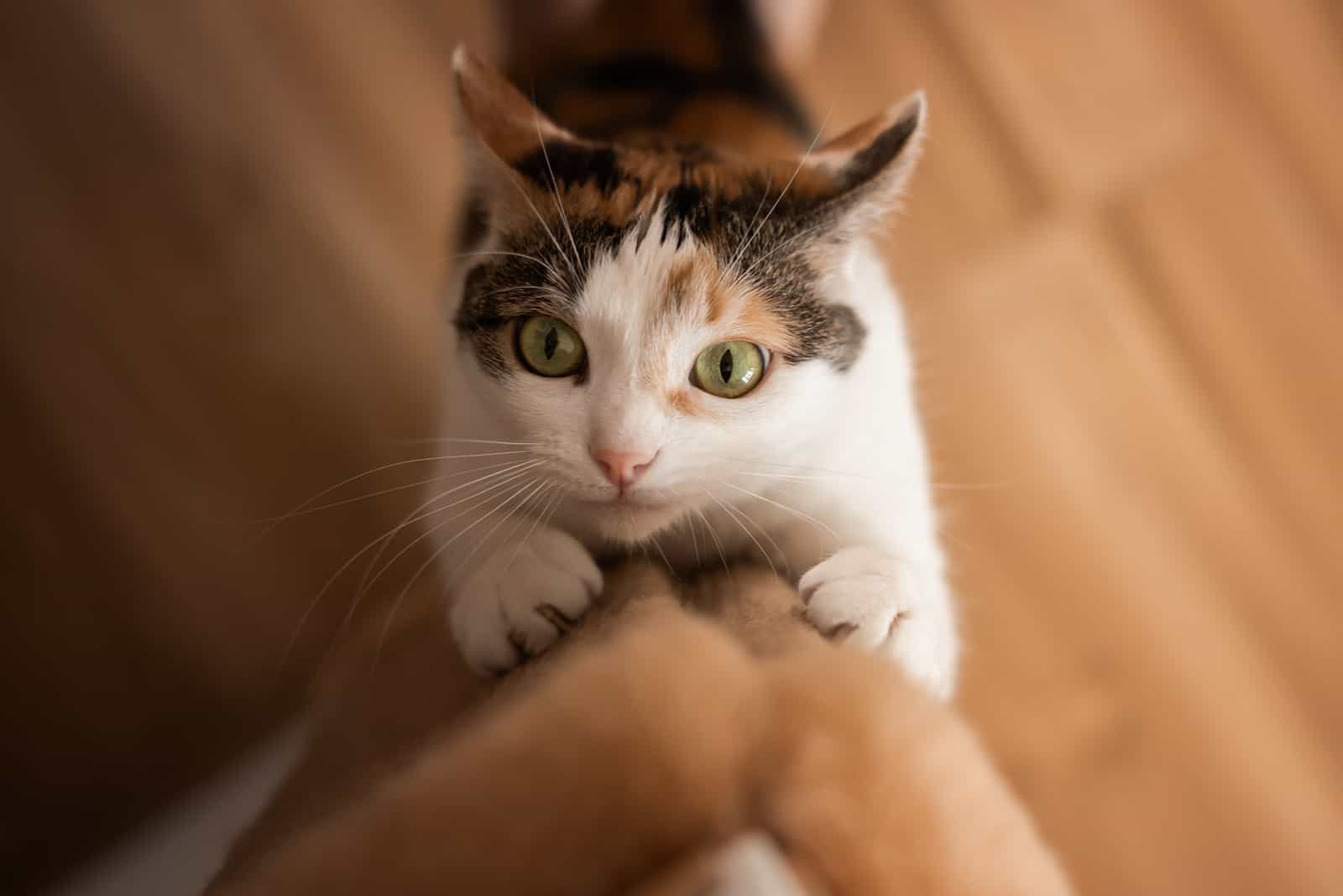
“Why does my cat scratch the wall after pooping?” seems like an oddly specific question to ask. It is nevertheless a valid question.
Perhaps your cat spares the wall most of the time, but attacks it after it poops.We’re here to tell you that this is perfectly normal, and it is linked to a cat’s natural instinct to bury their excrement.
You may notice that if there’s a problem with the litter box, your cat will go tooth and nail (literally) to try to dig a hole in the wall or the floor.
Cats bury their poop because they don’t want other cats to detect their smell. Combine that with the fact that they don’t tolerate messiness, and burying poop becomes a necessity.
If your cat is scratching the wall after pooping, it could be looking for a place to hide its excrement.
Check the litter box for problems, or consider getting a cat flap, so your cat can exit the house and do their business on actual soil.
7. Cat Scratching Walls After Eating
If your cat is scratching the walls after eating, this comes down to two reasons.
One of these reasons is linked to the fact that a full cat has excessive energy that it has to spend. This excess energy is often used up during playtime.
However, sometimes you don’t have time to play with your cat..
Since scratching is a comfortable and playful activity, your cat might just go and dig into a wall!
Another reason why your cat may be scratching the wall after eating can be linked to the feline instinct to hide the rest of their prey.
Similar to the jaguar that carries the rest of its prey into the tall branches, your cat might be trying to bury the rest of her food in the wall.
This habit is genetically ingrained into felines, who often bury the remainder of their food, so they can rely on it when there’s nothing else to eat.
8. Cat Scratching Walls After Using Litter Box
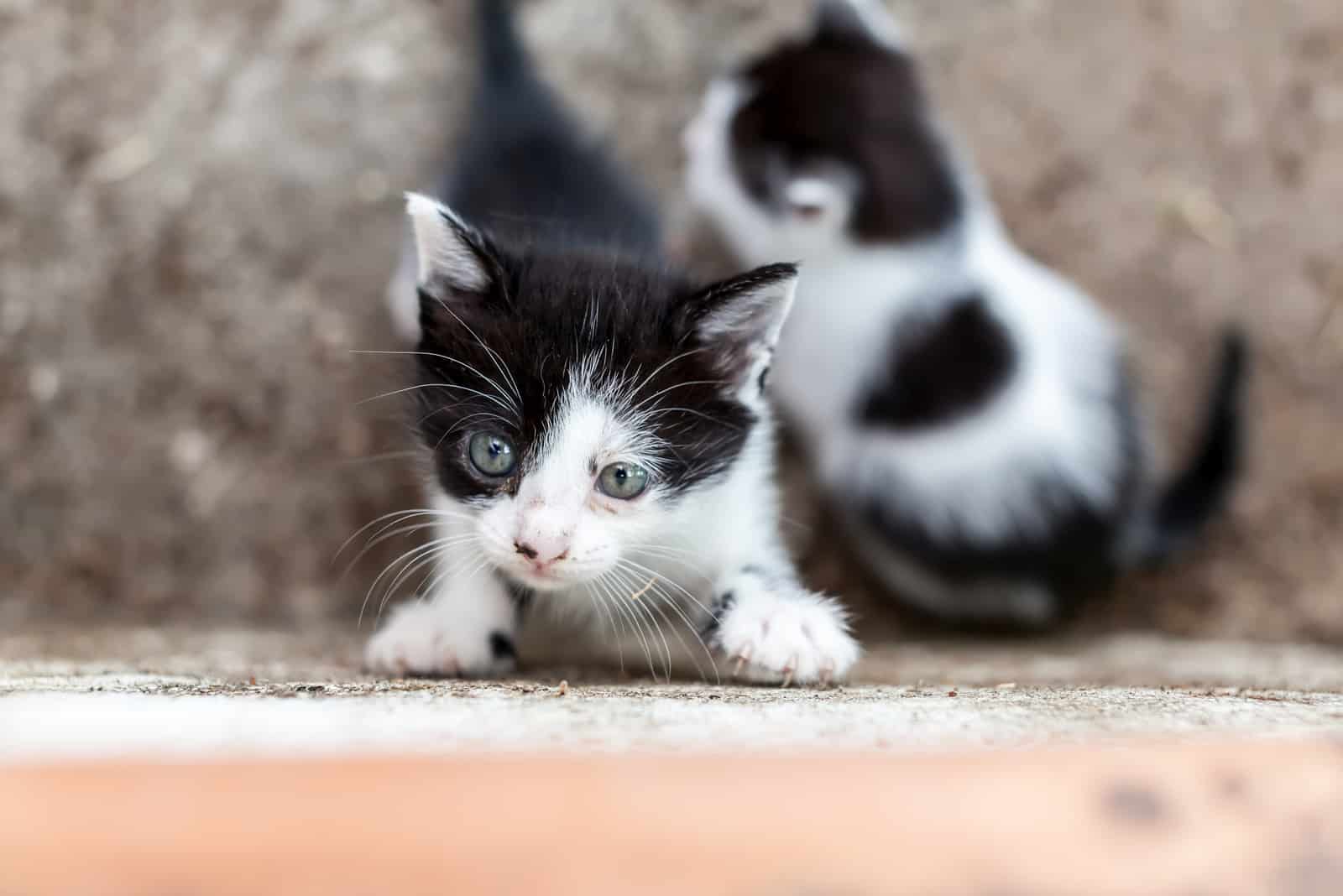
If your cat is scratching the walls immediately after using the litter box, it may indicate displeasure with the litterbox.
Most of the time, this displeasure will come from the fact that the litter box is too small. Your cat may not feel comfortable while littering in the litterbox, and will scratch the nearby wall as a result.
Additionally, maybe your cat’s feeling displeased with the litter in the litter box, which will also prompt it to scratch.
If you’ve recently changed the litter box or the litter, this might be the answer to “Why do cats scratch walls after littering”.
If this is the case, returning to previous products will fix the issue.
9. Scratching Reflective Surfaces
Reflections can be an intriguing thing for cats, especially for those unable to understand them such as younger cats.
This is a natural part of cat behavior; their need to investigate. If they see another cat in the same room as them, it is safe to assume they’ll go and check out the newcomer.
Some cats may even get hostile against their reflections, and they’ll proceed to try scratching the outsider.
Funnily enough, the reflection will respond in scratching, which will just increase the intensity of the act, since your cat will believe it’s being attacked.
This cat behavior will only stop if your cat understands that it’s fighting its own reflection, or if it gets tired and gives up.
10. Mice In The Walls
One of the reasons why your cat might be scratching the walls is the presence of mice in your walls.
If the wall scratching is accompanied by meowing, it is likely your cat is trying to flush out the intruders, while also alarming you of their presence.
This behavior will often occur at night, since that’s the time when house mice are most active. Your cat will notice them, and go straight to the place where the sound is coming from.
If you are getting woken up with scratching and meowing sounds, it might be a sign your house is infested with mice.
Mice infestation can bring many problems. From viruses and bacteria, to attracting snakes that feed on the mice. We recommend you fix this problem immediately.
Try to spread some food (eg. corn) on the floor before sleeping. If there are mice in your walls, they will come out to feed and your cat can catch them in action.
6 Tips For Stopping Your Cat From Scratching The Walls
Buying your cat a new scratching post and seeing it neglected is a sad feeling. Especially when your walls are getting scratched mercilessly!
You don’t want to get mad at your cat, because it’s not doing it just to annoy you.
Luckily there are methods that can help prevent your cat from scratching the walls. Read on for our top 6 ways to stop wall scratching.
1. Trim The Claws
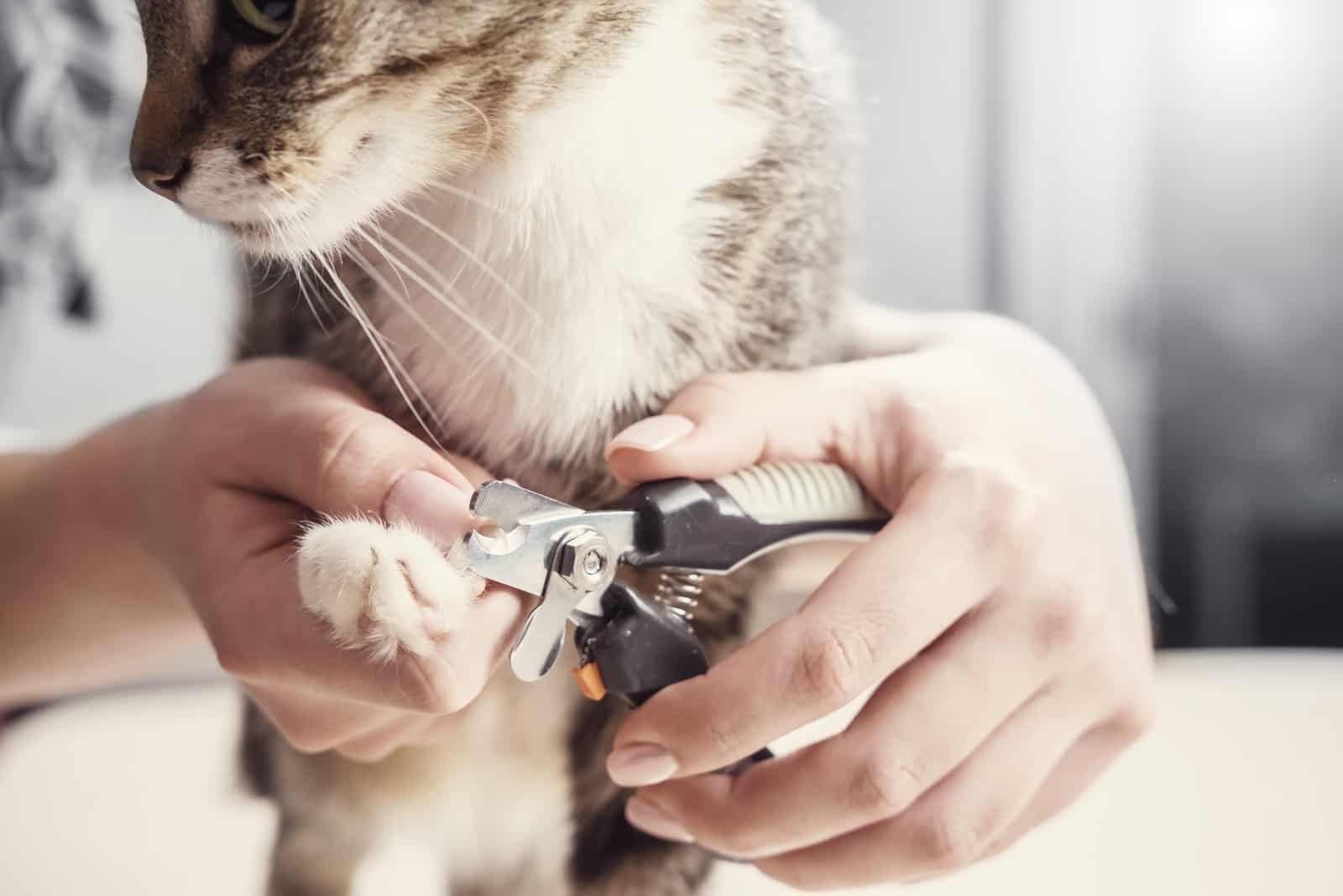
We’ve mentioned earlier that the most common reason for wall scratching is claw maintenance.
Your cat needs to have its claws in perfect order, to feel armed and protected against danger.
When the cat decides its claws are getting overgrown, no hard surfaces are safe. Anything that can remove the built-up sheath from the cat nail will be used as a grindstone.
If you don’t want the wall to become a grindstone, consider trimming the claws yourself. Get a pair of clippers, approach your cat slowly, and get to work.
Be advised, you won’t be able to pull this off if your cat doesn’t trust you yet.
2. Get A Cat Scratching Post
Having a scratching post in the house is one of the most important things for a cat owner. Cats have to scratch, and it’s best if they have something that is literally made for that.
Wood, metal, sisal, carpentry fabric, etc., can all be used to make a scratching post. We recommend you create as many different textures as you can. Different materials used in scratching posts will be used differently by your cat.
If you don’t want to spend a lot of money on scratching posts, we recommend you craft some of them yourself.
Cardboard, sisal, free-standing and wall mounted scratchers, will all be interesting to your cat, and much more tempting than an ordinary wall.
Spread these around your house to make sure that your cat always has an acceptable scratching surface.
Try applying some catnip on your scratching posts, so your cat feels attracted to them.
Of course, if you have multiple cats, get even more scratching posts, to prevent competitive fighting.
3. Pheromone Therapy
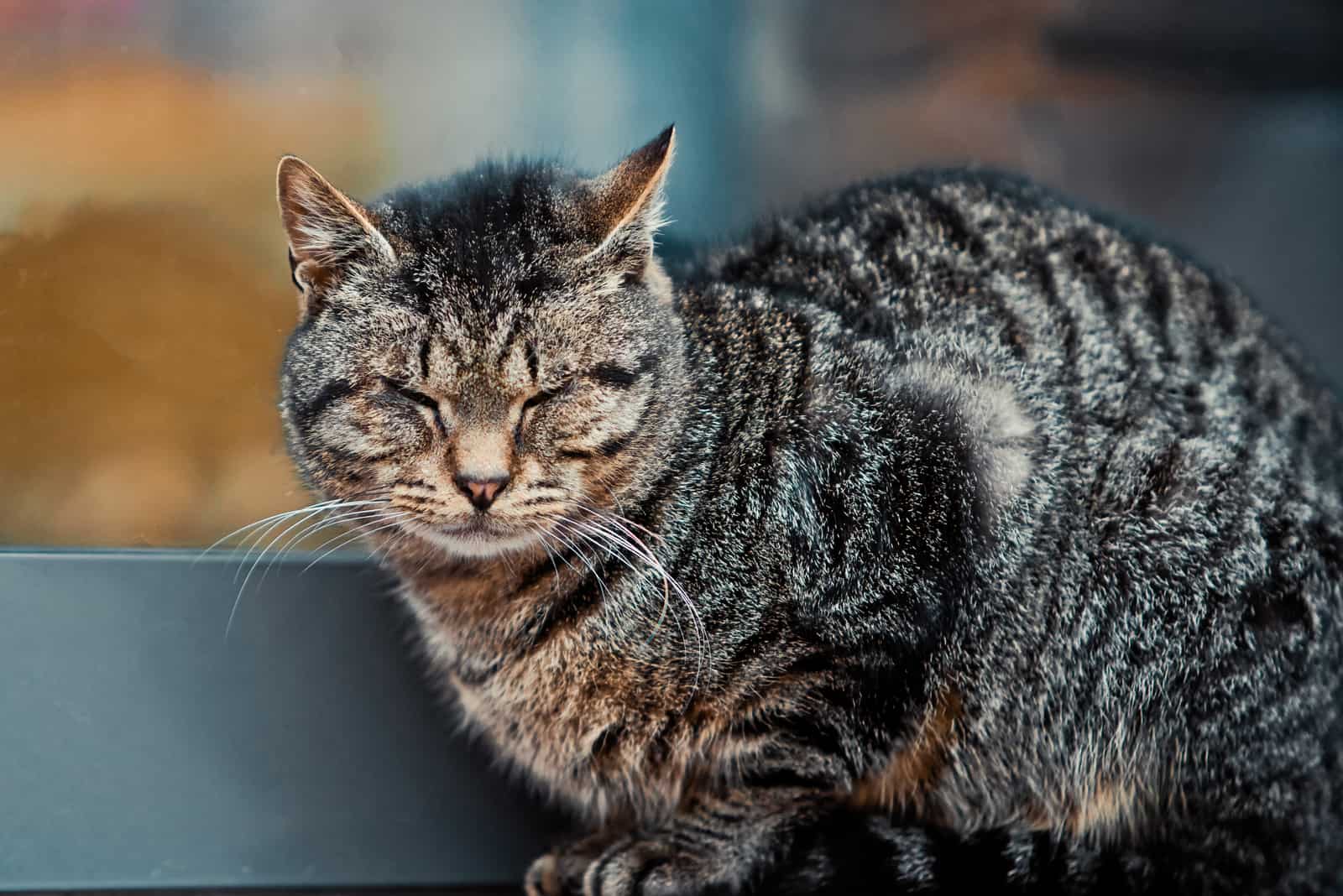
As discussed earlier, pheromones from other cats will often cause scratching of surfaces. Pheromone therapy can be used to calm your cat, and reduce inappropriate scratching caused by territorial behavior.
Pheromone therapy will involve spreading synthetic “neutral” pheromone scents that your cat will interpret as its own, which will cause it to calm down and feel more secure in the environment.
Products like Feliway diffusers are an example of synthetic pheromones that can be used.
You can also extract pheromones from your cat. Rub their cheeks softly with a piece of clothing, then simply rub this on surfaces in the cat’s territory.
Your cat will sense its pheromones in the house, and will not feel the need to mark its territory.
4. Take Your Cat Outside
We also suggest you take your cat for an outdoor exploration every once in a while.
Your cat may be feeling restrained being in the house all the time, and going outside will be good for it.
Cats have a lot of energy and if they don’t use it up productively, you can expect to find your favorite couch destroyed. Give your cat stimulation and this will make your life easier.
If you don’t have time to take your cat out regularly, you will have to schedule regular playtimes inside. You need to offer at least 15-20 minutes a day of playtimes, cuddles, and hunting simulations.
However, we still suggest regular trips, or at least installing a cat flap that your cat can use to go outside.
5. Indirect Punishment
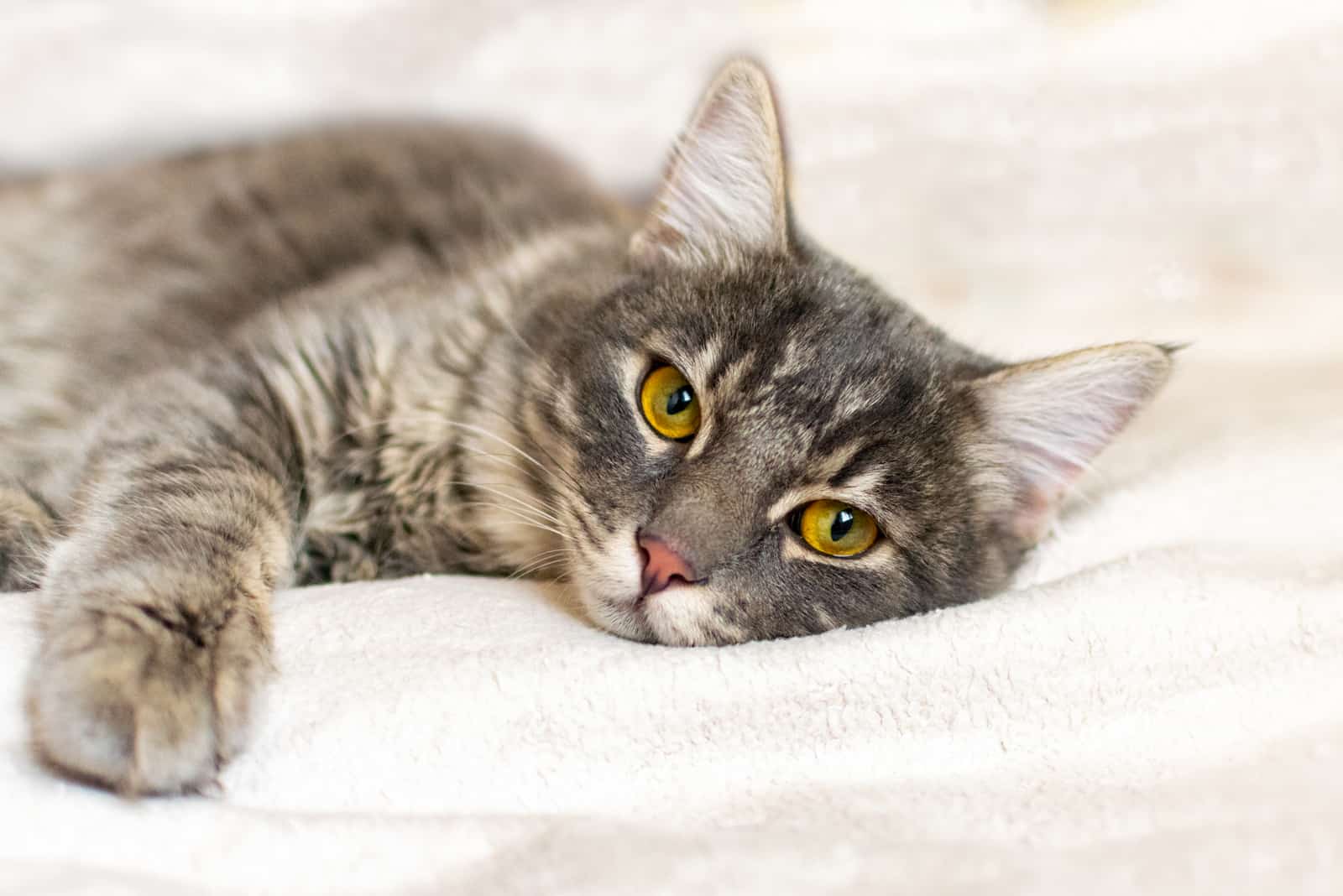
Indirect punishment is when you indirectly make your cat feel uncomfortable by overloading their senses.
It is very important that you don’t engage in this activity directly, since the cat will then regard you as the enemy. You have to do it subtly.
For example, you can use cat deterrents that will produce a high-pitched sound which will scare your cat.
For a more budget option, just get a whistle. Watch for signs that your cat is about to scratch the wall, and then blow the whistle loudly.
Loud noises make cats uncomfortable, and doing this regularly will make your cat connect the inappropriate scratching with loud noises, which should make the scratching stop.
6. Apply Unpleasant Materials
Another way to make sure that your cat hates scratching the walls is to cover them in an unpleasant material.
Similar to the loud noise method,you want the cat to decide for itself that it doesn’t want to scratch the walls. We can do this by making the walls repellent to the cat.
Try covering the cat’s usual places for scratching with materials like sandpaper, sticky tape, or aluminum foil.
Cats hate it when their paws come into contact with these materials, and if they encounter them often, they will probably return to scratching the scratching posts.
Should I Declaw My Cat?
You certainly should not! Your cat’s scratching might be driving you insane and you’ve thought to yourself “Should I get my cat declawed?”
We are here to tell you that this is not as good an idea as you may think. Here are the three main reasons why you shouldn’t declaw your cat:
• Declawing can often lead to infection, since the part removed is not only the nail. This will leave the tissue vulnerable.
• Claws are very important for cats as a means of movement and self-defense. If you declaw your cat, it might start feeling unsafe and anxious, which can lead to biting.
• Researchers claim that cats that have been declawed, feel pain when littering.
Final Thoughts
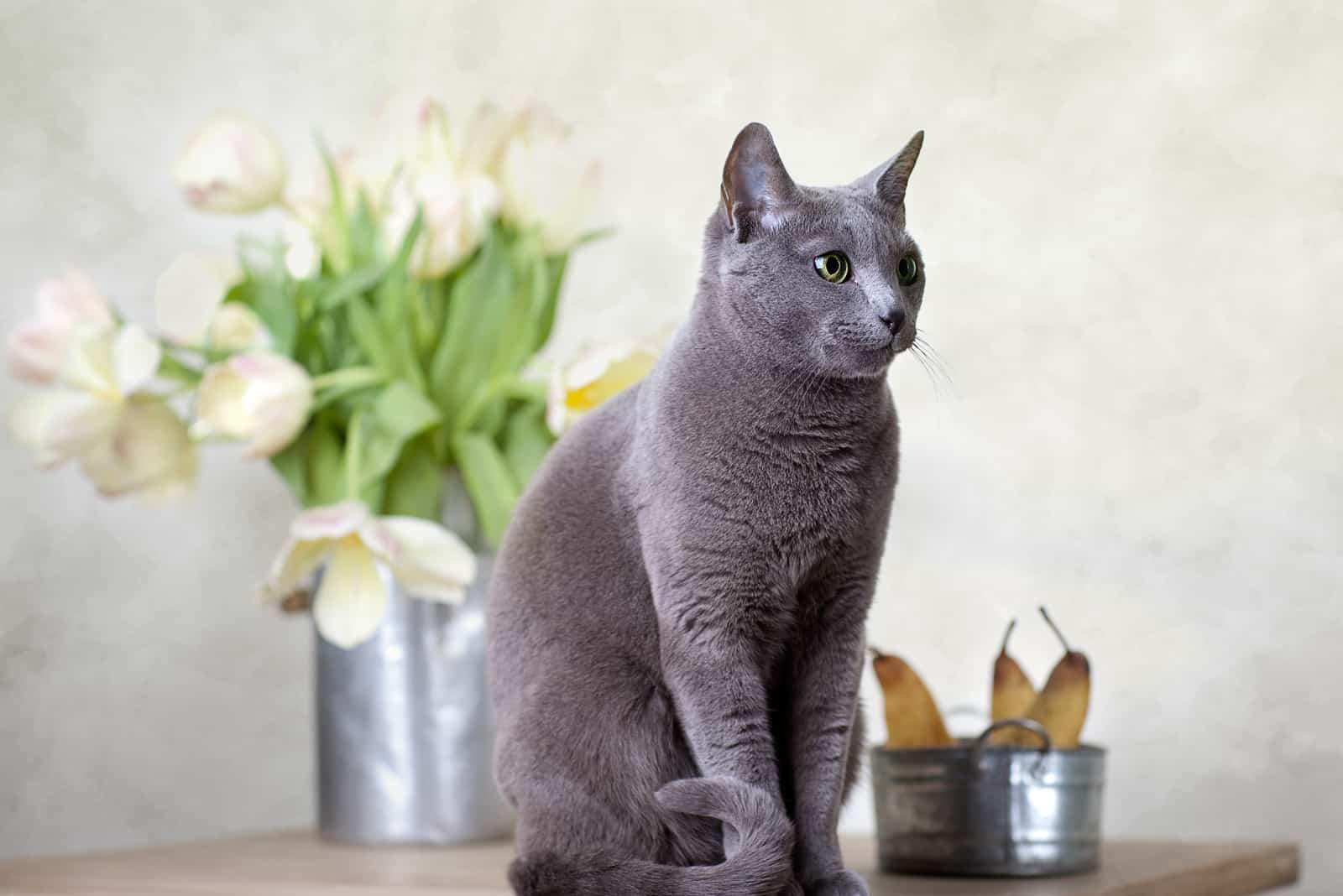
Cat’s claws are one of the most iconic weapons in the animal kingdom. Whether wielded by a lion or a domestic cat, these sharp blades are always formidable.
If this is your first cat, “Why does my cat scratch the wall” is a question that will have to be addressed.
Cats will often engage in scratching behavior for various reasons.
Your cat can be feeling threatened, uneasy, happy, or lonely and it can all result in inappropriate scratching. Or it can all be simple maintenance.
If none of the information above was helpful to you, we recommend you consult your vet, since a professional opinion is always the best answer.

